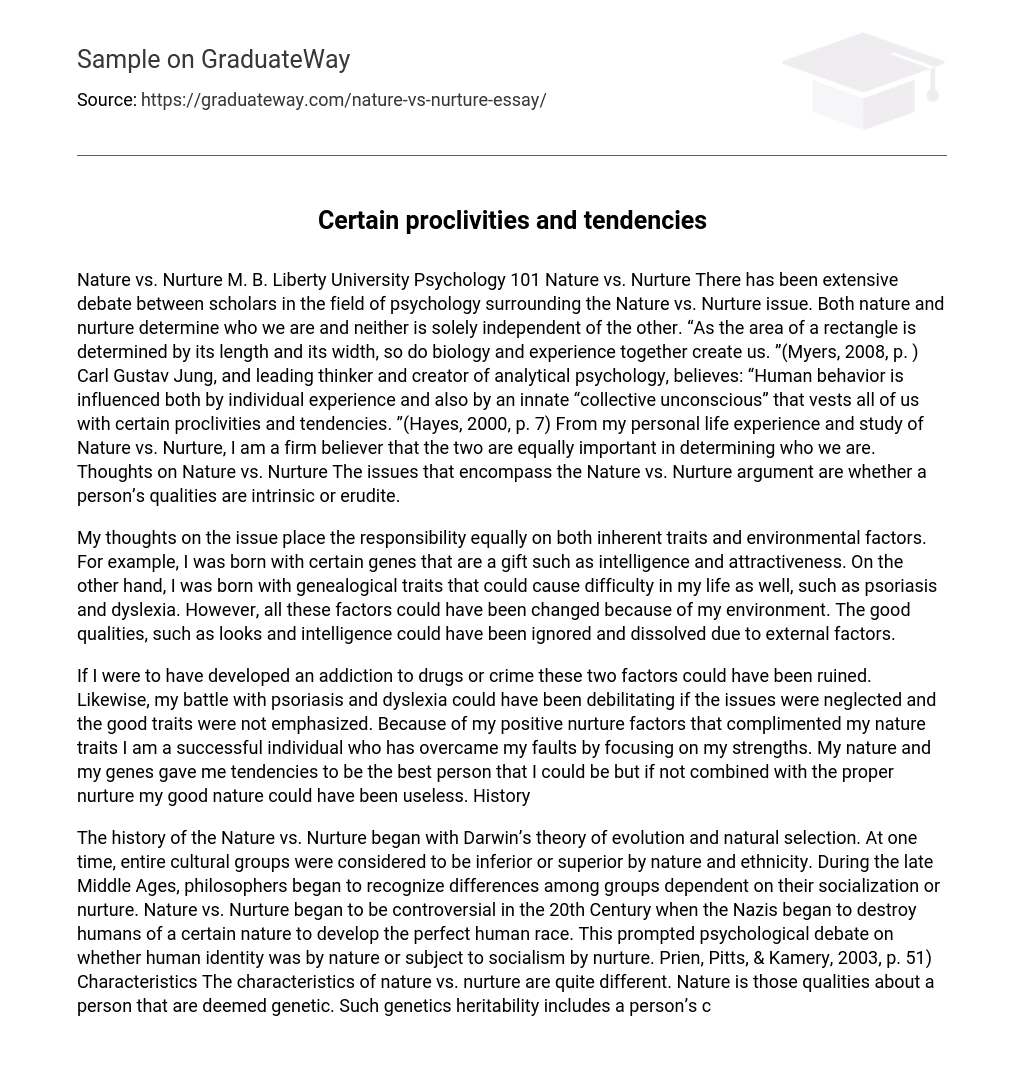Both nature and nurture are intertwined in shaping our identities, as stated by Myers (2008). Similar to the calculation of a rectangle’s area, our biology and experiences rely on both length and width to define who we are. Additionally, Carl Gustav Jung, a prominent figure in analytical psychology, suggests that human behavior is influenced not only by personal experiences but also by an inherent “collective unconscious” that impacts our inclinations and predispositions (Hayes, 2000, p. 7).
From my personal life experience and study of Nature vs. Nurture, I firmly hold the belief that both factors have an equal significance in shaping our identities. The ongoing discussion revolving around Nature vs. Nurture focuses on determining whether our qualities are inherent or acquired.
Both inherent traits and environmental factors bear equal responsibility for the issue at hand. For instance, certain genes that I was born with, like intelligence and attractiveness, are considered positive attributes. Conversely, genealogical traits such as psoriasis and dyslexia could pose challenges in my life. Nevertheless, the influence of my surroundings could have altered all of these factors. External forces could have diminished the significance of advantageous qualities like appearance and intellect.
If I had developed an addiction to drugs or crime, these two factors could have been ruined. Similarly, my struggle with psoriasis and dyslexia could have been crippling if these issues were ignored and my positive traits were not emphasized. Due to the positive nurture factors that complemented my nature traits, I am now a successful individual who has overcome my faults by focusing on my strengths. My nature and genes provided me with the potential to be the best person I could be, but without the right nurture, my good nature could have been ineffective.
The history of the Nature vs. Nurture debate originated from Darwin’s theory of evolution and natural selection. In the past, entire cultural groups were classified as either inferior or superior based on their nature and ethnicity. However, during the late Middle Ages, philosophers began acknowledging differences among groups that were influenced by their socialization or nurture. The controversy surrounding Nature vs. Nurture intensified in the 20th Century when the Nazis started exterminating individuals with specific characteristics to create a so-called perfect human race. This led to psychological discussions on whether human identity is determined by nature or can be shaped by nurture under socialism. (Prien, Pitts, & Kamery, 2003, p. 51)
The characteristics of individuals reveal the distinction between nature and nurture. Nature, which is determined by genetics, encompasses inherited traits like color and gender. It represents an individual’s biological determinism. Conversely, nurture involves external influences and environmental factors influenced by social status and education. These factors play a role in shaping a person’s character.
In my opinion, an individual’s personality and intelligence are influenced by both nature and nurture. This viewpoint is a subject of extensive discussion but remains unrefuted. John Tooby and Leda Cosmides, prominent figures in the study of nature vs. nurture, contend that evolutionary psychology challenges conventional divisions such as instinct vs. reasoning, innate vs. learned, and biological vs. cultural.
The impact of the environment on an organism is determined by its evolved cognitive architecture (Hayes, 2000, p. 7). When reflecting on the Nature vs. Nurture debate, I considered my personal experiences and acquired knowledge. These factors have led me to believe that viewing one as more influential than the other is misleading. Instead, we should accept Nature vs. Nurture as a combination and cease debating it. By now, we should have a word that encompasses both concepts.
According to Myers (2008, p. 182), the combination of genetics and the environment has an impact on our identity. It is not a matter of biology versus culture; instead, our true selves are shaped by the interaction between these factors and how we personally respond to our circumstances.
References
- Hayes, B. J. (2000). The nature vs nurture debate or controversy- human psychology. Retrieved March 11, 2009, from http://www. age-of-the-sage. org/psychology/nature_nurture. html
- Myers, D. G. (2008). Social Psychology (9th ed. ). [Adobe Digital Editions]. Retrieved from Social_Psychology_Entire_Ebook. df(Secured)





